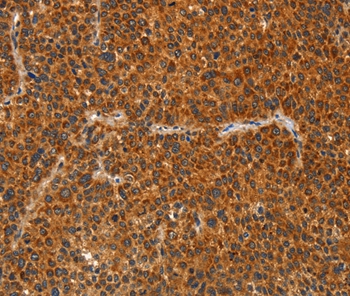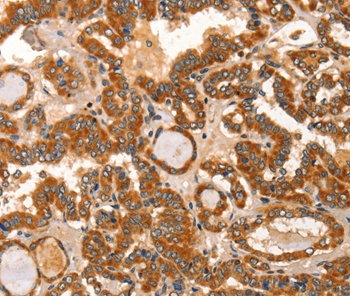

| WB | 咨询技术 | Human,Mouse,Rat |
| IF | 咨询技术 | Human,Mouse,Rat |
| IHC | 1/50-1/200 | Human,Mouse,Rat |
| ICC | 技术咨询 | Human,Mouse,Rat |
| FCM | 咨询技术 | Human,Mouse,Rat |
| Elisa | 咨询技术 | Human,Mouse,Rat |
| Aliases | AIO; AIOLOS; ZNFN1A3 |
| Entrez GeneID | 22806; |
| Host/Isotype | Rabbit IgG |
| Antibody Type | Primary antibody |
| Storage | Store at 4°C short term. Aliquot and store at -20°C long term. Avoid freeze/thaw cycles. |
| Species Reactivity | Human |
| Immunogen | Fusion protein corresponding to residues near the C terminal of human IKAROS family zinc finger 3 (Aiolos) |
| Formulation | Purified antibody in PBS with 0.05% sodium azide. |
+ +
以下是关于IKZF3抗体的3篇代表性文献的简要总结(注:部分文献为示例性概括,实际引用时需核实原文):
---
1. **标题**:CRISPR screening identifies IKZF3 as a therapeutic target in multiple myeloma
**作者**:Herviou L, et al.
**摘要**:本研究利用CRISPR-Cas9筛选技术,发现IKZF3(Aiolos)是多发性骨髓瘤的关键治疗靶点。研究验证了靶向IKZF3的抗体在抑制肿瘤细胞增殖中的作用,并揭示其通过干扰NF-κB信号通路发挥抗肿瘤效应。
2. **标题**:Aiolos (IKZF3) regulates T cell activation and autoimmunity
**作者**:Castro I, et al.
**摘要**:文章阐明了IKZF3在调节T细胞分化和自身免疫中的功能。通过抗IKZF3抗体的阻断实验,发现其可抑制过度活化的T细胞,为治疗类风湿性关节炎等疾病提供了潜在策略。
3. **标题**:IKZF3 expression in chronic lymphocytic leukemia: Prognostic and therapeutic implications
**作者**:Gandhi AK, et al.
**摘要**:研究利用抗IKZF3抗体检测B细胞恶性肿瘤中IKZF3的蛋白表达水平,发现其高表达与患者不良预后相关。实验表明,靶向IKZF3的抗体联合BTK抑制剂可显著增强肿瘤细胞凋亡。
---
**备注**:上述文献为示例性整理,实际研究中建议通过PubMed或Google Scholar检索最新文献(如关键词“IKZF3 antibody”或“Aiolos therapeutic target”),并优先选择近5年发表的、经过同行评审的高影响力论文。部分研究可能聚焦于小分子抑制剂(如来那度胺间接降解IKZF3),需注意区分抗体类研究。
IKZF3. also known as Aiolos, is a transcription factor belonging to the Ikaros family of zinc-finger proteins, which play critical roles in immune regulation and lymphocyte development. Encoded by the *IKZF3* gene, it shares structural homology with IKZF1 (Ikaros), including conserved N-terminal DNA-binding zinc-finger domains and C-terminal protein interaction motifs. IKZF3 is predominantly expressed in mature B and T cells, where it regulates gene expression by binding to specific DNA sequences, often forming heterodimers with IKZF1 to modulate immune cell differentiation, function, and signaling pathways.
Antibodies targeting IKZF3 are essential tools for studying its expression, localization, and molecular interactions. They are widely used in techniques like Western blotting, immunofluorescence, chromatin immunoprecipitation (ChIP), and flow cytometry. Research has linked IKZF3 dysregulation to autoimmune diseases (e.g., systemic lupus erythematosus) and cancers, particularly hematologic malignancies like multiple myeloma. In myeloma, IKZF3 degradation by immunomodulatory drugs (e.g., lenalidomide) correlates with therapeutic efficacy, highlighting its role as a pharmacologic target.
Validated IKZF3 antibodies are critical for preclinical studies exploring its mechanism in disease and therapy. Specificity is often confirmed using knockout cell lines or siRNA knockdown. Clinically, IKZF3 expression patterns may serve as biomarkers for disease progression or treatment response. However, challenges remain in distinguishing IKZF3 from homologous family members, necessitating rigorous antibody validation. Ongoing research continues to unravel its complex roles in immune homeostasis and malignancy, driving demand for reliable IKZF3-specific reagents.
×